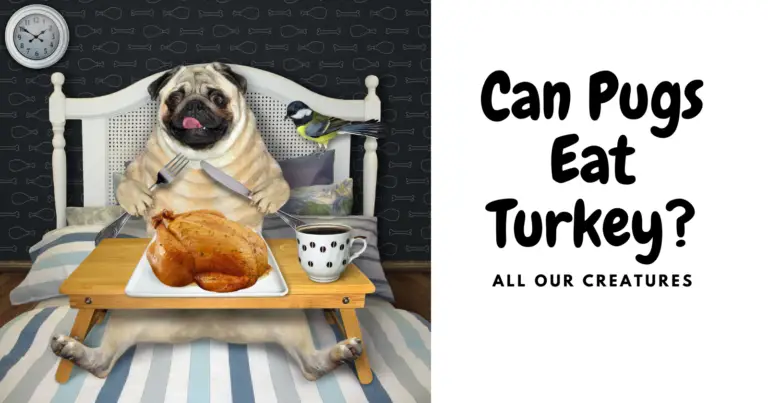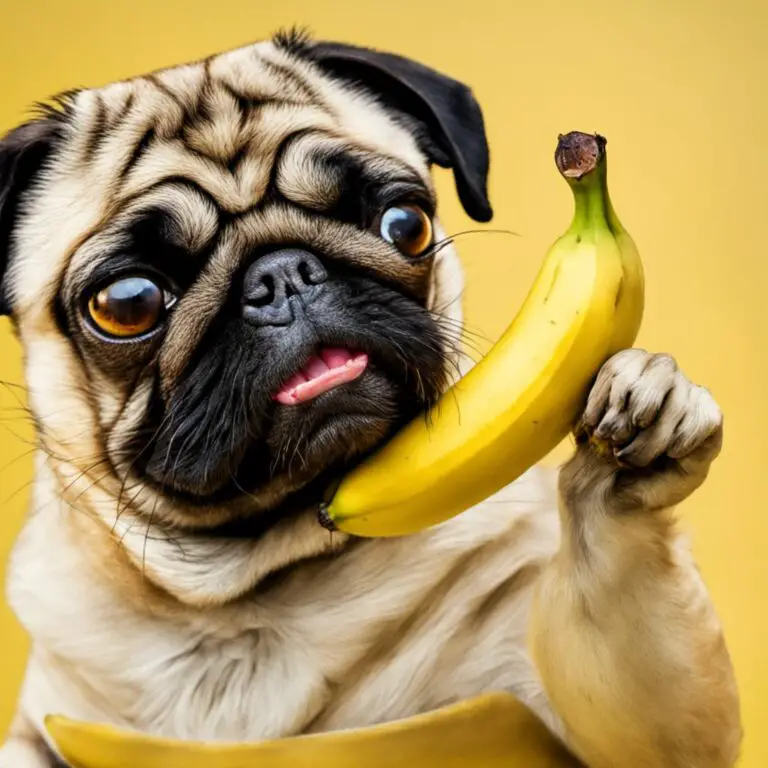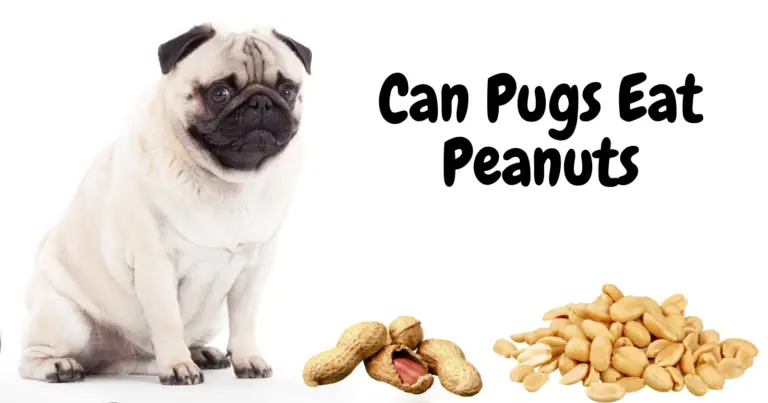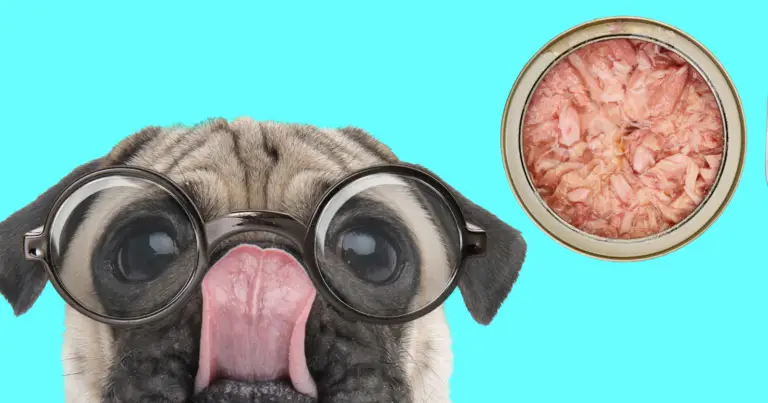Can Pugs Eat Melon? A Nutritional Guide for Dog Owners
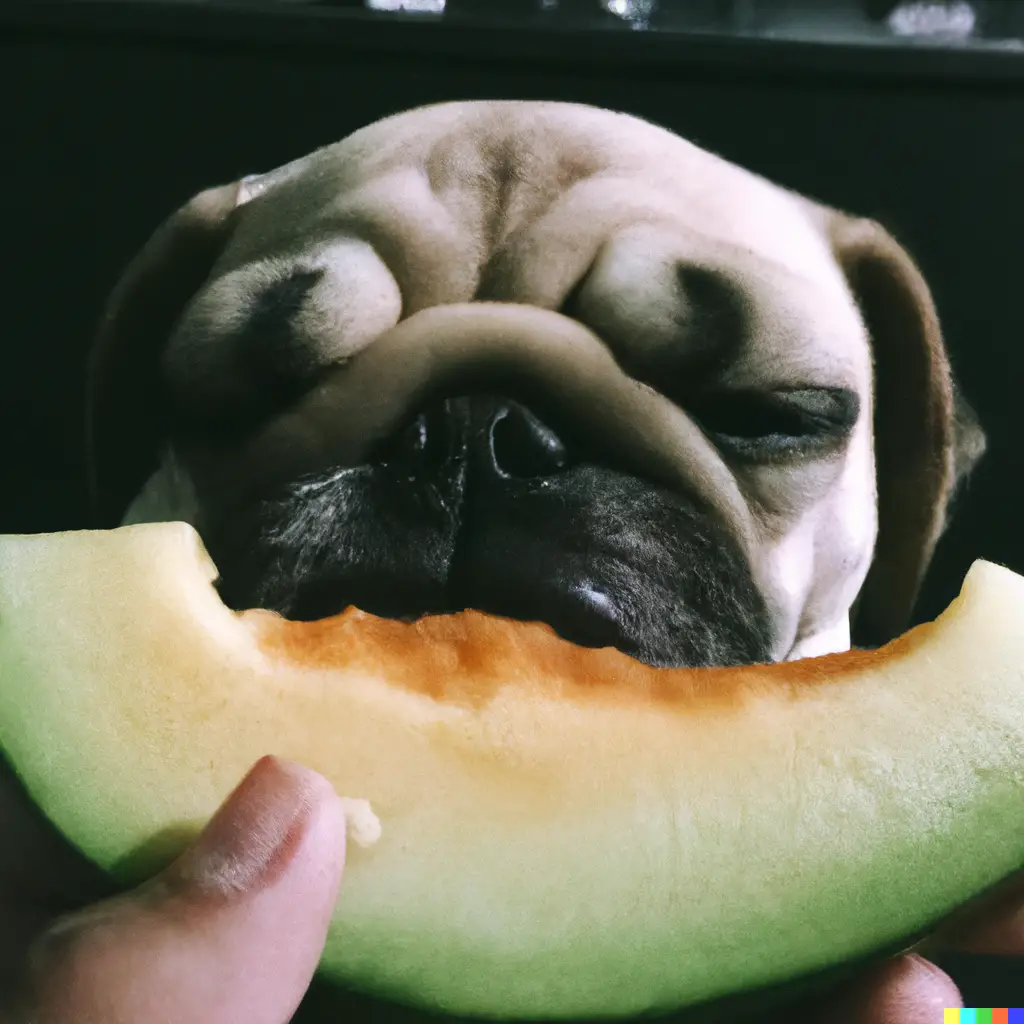
As a pug owner, you might be curious about the types of fruits that are safe for your furry friend to snack on. Melons, such as cantaloupe and watermelon, are popular choices due to their juicy and refreshing taste. But can pugs eat melon without any issues? Let’s dive into the topic and provide some helpful information for you.
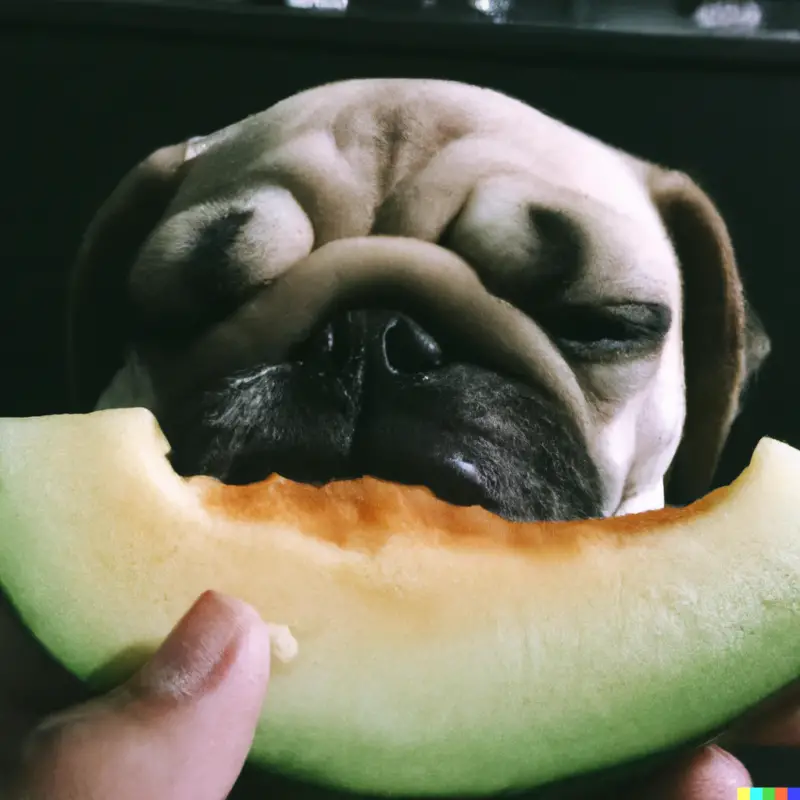
Both cantaloupe and watermelon are generally safe for pugs to consume. In fact, these fruits offer some health benefits for your pet. Cantaloupe provides dietary fiber, vitamins, and potassium, while watermelon is a healthy way to keep your dog hydrated due to its high water content. However, there are a few precautionary steps to remember when feeding melons to your pug.
When offering melon to your pug, always remove the rind and seeds first, as these parts can cause intestinal blockages. Also, ensure to serve the fruit in moderation, as excessive consumption may lead to digestive issues. By paying attention to these guidelines, you can safely enjoy sharing a melon treat with your beloved pug.
Contents
Table of Contents
Understanding Pugs Diet
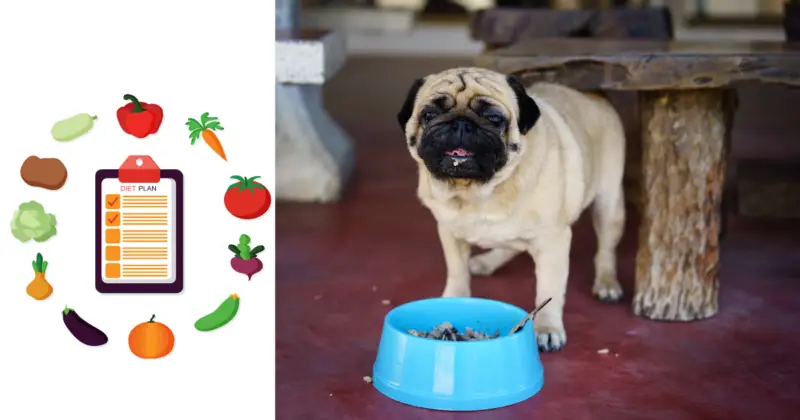
Dietary Needs of Pugs
As a pug owner, it’s essential to understand your pet’s dietary needs. Pugs are a small breed that requires a unique balance of nutrients. Their diet should be rich in protein, minerals, vitamins, and dietary fiber. These components are crucial for maintaining their overall health and well-being.
Get The Free Food Eating Guide That Keeps My Pug Happy and Playful Even at 13 Years Old
100% Beginner Friendly & Lists Real Foods Your Pug Can Actually Eat!

Protein is vital for pugs; it helps build and maintain their muscles, tissues, and organs. Adult pugs ideally require around 18% crude protein in their diet. It’s necessary to ensure your pug’s dog food doesn’t exceed 22% protein content.
Minerals and vitamins are also important for pugs, as they support various bodily functions, such as bone and immune system health. Provide foods rich in essential nutrients like calcium, phosphorus, and vitamins A, D, and E.
Dietary fiber is another essential component of a pug’s diet. It aids in digestion and regulates bowel movements, keeping your pug’s gastrointestinal health in check.
Balanced Diet for Pugs
In order to provide a balanced diet for your pug, focus on high-quality dog food specifically formulated for small breeds. Ensure the food contains the right protein, fats, carbohydrates, minerals, and vitamins.
When choosing dog food, look for products with the following macronutrient profiles:
- Protein: 18-22% for adults, slightly higher for growing puppies
- Fats: 5% for adult pugs, 8% for puppies
- Carbohydrates: Moderate amounts for providing energy
In addition to dog food, you can also offer your pug-safe fruits and vegetables as treats. Foods such as cantaloupe and watermelon are low-calorie, high-water-content fruits that can help keep your pug hydrated and provide extra vitamins and minerals. However, treats should be given in moderation and makeup no more than 10% of your pug’s overall diet.
Monitoring your pug’s weight is crucial, as obesity can lead to numerous health issues. Providing a well-rounded, age-appropriate, and nutrient-dense diet ensures your pug thrives and enjoys a healthy, happy life.
Can Pugs Consume Melon
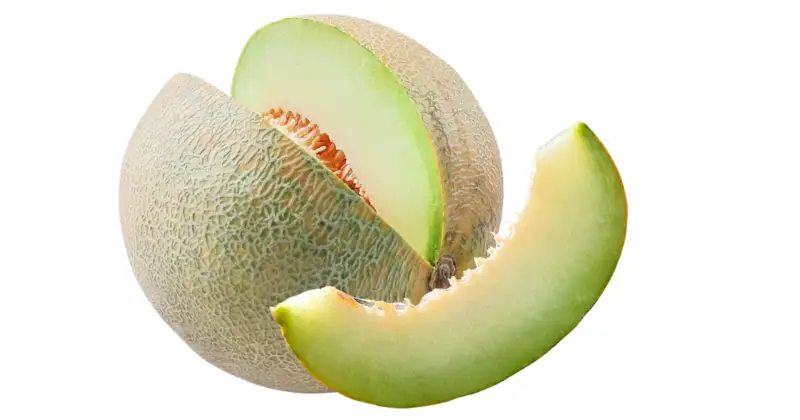
Types of Melons Pugs Can Eat
When it comes to your pug’s diet, you may be wondering if melons are a safe and nutritious choice. There is a wide range of melon types; some are more suitable for pugs than others. For instance, cantaloupe is a fantastic option for pugs due to its low-calorie content and high water content, keeping your furry friend hydrated and healthy without contributing to weight gain.
Another melon variety that pugs can safely consume is watermelon. According to a comprehensive dietary guide, watermelon is a nutritious summer treat for pugs, as long as seeds and rind are removed to prevent choking hazards.
Benefits of Melon to Pugs
Melons are safe for pugs to eat and provide numerous health benefits. Both cantaloupe and watermelon are rich in vitamins A and C, essential for maintaining your pug’s overall well-being. Vitamin A contributes to healthy vision, skin, and immune system, while vitamin C aids in the immune system’s efficiency and fights off diseases.
In addition to vitamins, melons are an excellent dietary fiber source, promoting healthy digestion and preventing constipation. The low-calorie content of melons, particularly in cantaloupe, makes them an ideal treat for weight management in pugs, ensuring they stay fit and trim.
In conclusion, offering melon as a treat for your pug can provide numerous health benefits, such as hydration, vitamins, and fiber. Just remember to remove the seeds and rind to avoid any potential hazards, and keep an eye on portion sizes. With this in mind, feel confident introducing melon as a delicious and nutritious treat for your beloved pug.
Feeding Your Pug Different Kinds of Melon
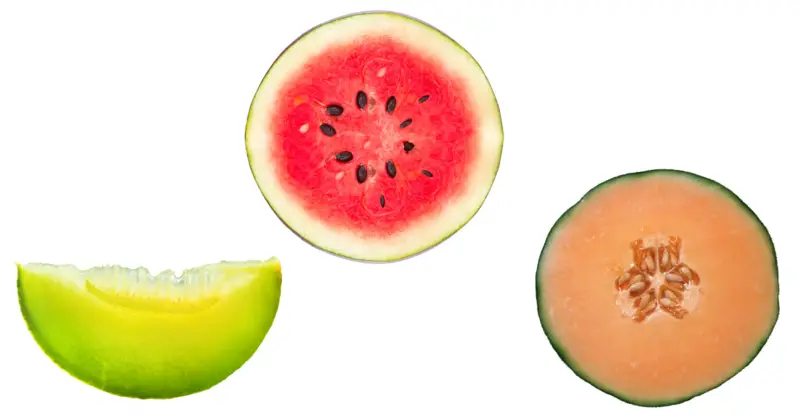
Feeding Watermelon to Your Pug
Watermelon is a safe and healthy fruit for your pug to enjoy if you follow some precautions. Firstly, remove the seeds, as they can pose a choking hazard and potentially cause digestive issues. It’s also important to avoid giving your pug the rind of the watermelon, as it is tough and difficult to digest. Stick to the juicy, seedless flesh for a refreshing and hydrating snack.
Feeding your pug watermelon offers several benefits, too. Watermelon is a great source of hydration, especially during hot summer days. It’s also rich in nutrients like vitamins A and C, potassium, and magnesium. Remember to give watermelon in moderation, as too much of it can lead to diarrhea due to its high water content.
Feeding Cantaloupe to Your Pug
Cantaloupe is another melon variety that is safe for your pug to eat. Just like with watermelon, you’ll want to remove the seeds and peel before offering cantaloupe to your pug. The flesh of cantaloupe is a good source of vitamins A and C and other nutrients that help support your pug’s overall health.
When feeding cantaloupe, make sure to give it in small quantities to avoid overfeeding. Moderation is key, as too much cantaloupe can lead to digestive issues in your pug. Providing cantaloupe in reasonable portions will ensure that your pug enjoys the benefits of this healthy fruit without overwhelming their digestive system.
In conclusion, melons like watermelon and cantaloupe can be great additions to your pug’s diet. They offer hydration, vitamins, and a refreshing taste. Always remember to remove seeds, rinds, and peels, and serve these fruits in moderation to keep your pug healthy and happy.
Melon as a Treat for Pugs

How to Use Melon as a Treat
Melons, such as cantaloupe and watermelon, can be a refreshing and healthy treat for your pug. Their high water content and low calories help keep your pug both hydrated and satisfied without contributing to weight gain. To serve melon as a treat, follow these simple steps:
- Wash the melon: Make sure to rinse the melon thoroughly under running water to remove dirt and any potential contaminants.
- Slice the melon: Cut the melon into small, manageable pieces for your pug to easily consume. Avoid giving your pug large chunks, as it may pose a choking hazard.
- Remove seeds: If you’re serving cantaloupe or watermelon, remove any seeds, as they can pose a choking risk or cause digestive problems for your pug. In the case of watermelon, only the flesh is safe and nutritious, so avoid giving rinds or seeds.
- Portion control: Offer your pug a small amount of melon at once as an occasional treat or snack.
Moderation is Key
When giving your pug melon as a treat, moderation is essential. Although melons are rich in vitamins and minerals, giving your pug too much can lead to an imbalance in their diet and potential health issues. Melons should not replace your pug’s regular meals but can be given as an occasional snack to supplement their diet.
Here are some guidelines to keep in mind when offering melon treats to your pug:
- Frequency: Offer melon treats no more than a few times weekly to maintain a balanced diet.
- Amount: A small slice or a few pieces of melon at a time is sufficient for your pug.
By offering your pug melon treats in moderation, you can help ensure they receive the benefits of this healthy and hydrating snack while maintaining a balanced and nutritious diet.
Can Pugs Eat Melon? Watch this
Potential Risks and Precautions
Watching Out for Allergic Reactions
Always monitor your pug for signs of allergic reactions when trying new foods like melon, as individual sensitivities can vary. Symptoms of an allergic reaction may include itching, swelling, or difficulty breathing. If your pug shows any distress signs, consult your veterinarian immediately.
Avoiding Choke Hazards
When feeding melon to your pug, removing the seeds and rind before serving is crucial. The seeds could pose a choking hazard, while the rind can be hard to digest, potentially causing intestinal blockages. To avoid these risks, always cut the melon into small, bite-sized pieces that are easy for your pug to eat.
Understanding the Risks of Overconsumption
Moderation is key when offering melon to your pug due to its high sugar and calorie content. Consuming large amounts of sugar can lead to weight gain, which increases the risk of obesity and related health issues. Additionally, excessive sugar intake may contribute to the development of diabetes in some dogs.
Keep in mind that while melon has nutritional benefits, it should not replace your pug’s regular diet. Offering melon as an occasional treat can provide variety and help your furry friend maintain a balanced, nutritious diet.
Other Safe Fruits for Pugs
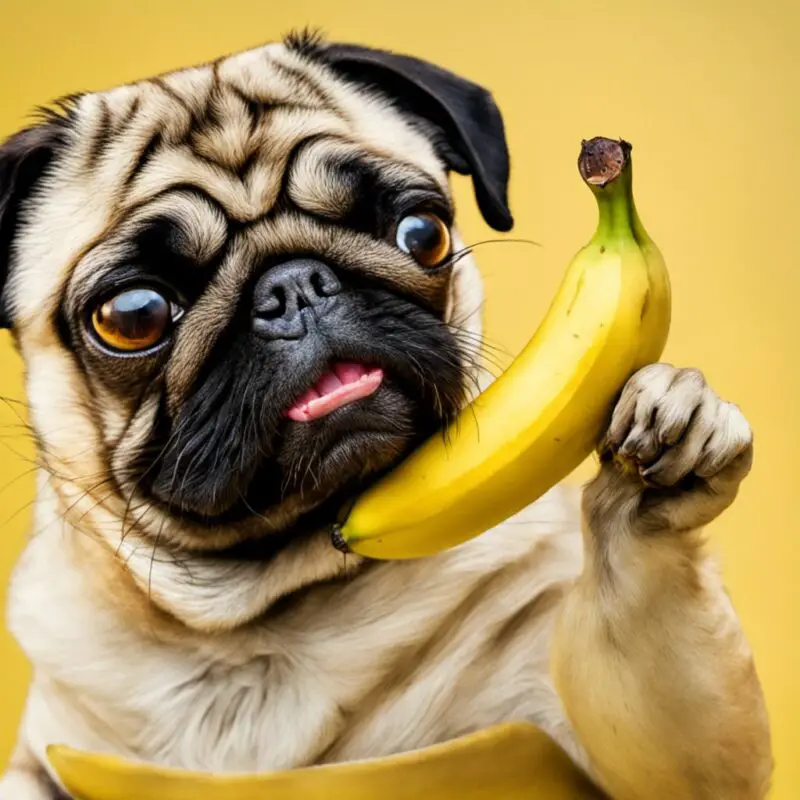
In addition to melons, there are several other fruits that can provide valuable nutrients to your Pug. These fruits are packed with vitamins, fiber, and hydration that keep your dog healthy and happy.
Feeding Apples to Pugs
Apples are a great option for your Pug, as they provide essential vitamins A and C and fiber for your dog’s digestive health1. Make sure to remove the seeds and core before feeding apples to your Pug. The skin is perfectly safe for your Pug to eat, and they will enjoy the crunch and sweetness of this treat.
Feeding Bananas to Pugs
Bananas are another safe fruit for your Pug. They are packed with potassium and natural sugars, which can give your dog a much-needed energy boost. Additionally, bananas can help keep your Pug hydrated, particularly during hot weather2. When offering bananas to your Pug, simply peel and slice the fruit into bite-sized pieces, making it easy for them to chew and enjoy.
Feeding Blueberries to Pugs
Blueberries are an excellent choice for your Pug, as they are rich in antioxidants and vitamins, promoting overall well-being3. These bite-sized fruits can be offered to your Pug as a healthy treat or mixed into their regular meals. Be sure to wash the blueberries thoroughly before serving them, and remember to feed this fruit in moderation.
Incorporating these fruits into your Pug’s diet will provide your pet with a varied and nutritious meal plan that keeps them healthy and satisfied.
Fruits to Avoid for Pugs
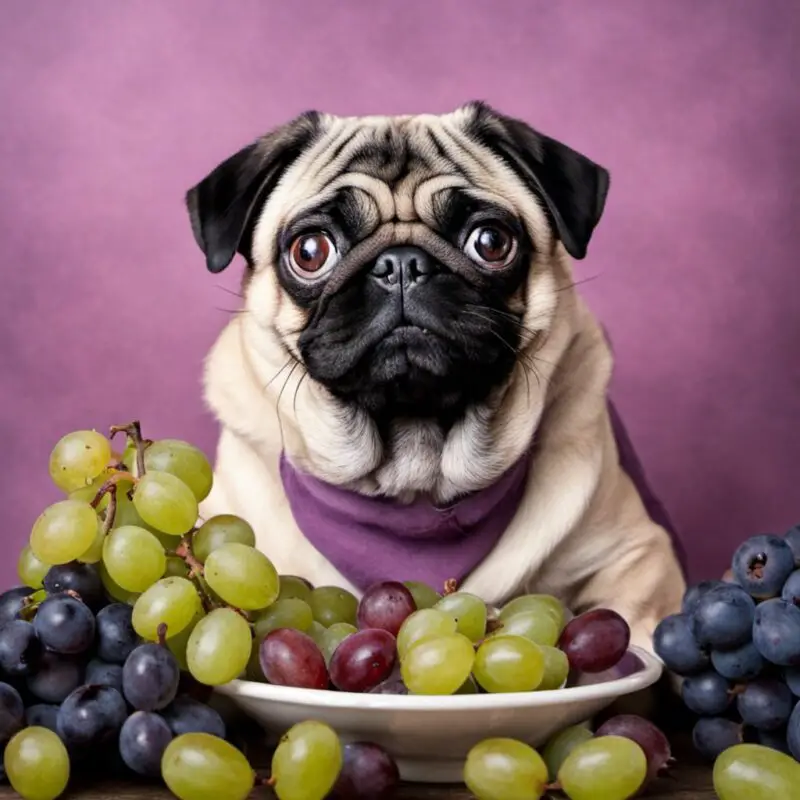
Harmful Effects of Grapes
Grapes can be extremely dangerous to Pugs and other dogs. The exact toxin in grapes responsible for causing harm is still unknown, but they can lead to severe health issues like kidney failure. Even small amounts of grapes or raisins can be fatal for your Pug. Symptoms of grape toxicity may include vomiting, diarrhea, weakness, and abdominal pain. If you suspect your Pug has ingested grapes, seek immediate veterinary attention.
Dangers of Avocados
While avocados are a healthy treat for humans, they can be hazardous for your Pug. This fruit contains a toxin called persin which can cause health problems in dogs. Although the highest concentration of persin is found in avocado pits and skin, even the pulp can be harmful to your Pug. Common symptoms of avocado toxicity include vomiting, diarrhea, and difficulty breathing. Ensure avocados are kept out of your Pug’s reach to avoid potential risks.
Why to Avoid Onions
Onions, including all forms such as raw, cooked, or powdered, should be strictly avoided when it comes to your Pug’s diet. They contain a compound called N-propyl disulfide, which can damage red blood cells and lead to anemia in dogs. Some of the symptoms associated with onion toxicity are pale gums, weakness, rapid breathing, and vomiting. It is crucial to keep onion-containing foods away from your Pug and monitor them closely for any signs of distress.
Consulting with a Veterinarian
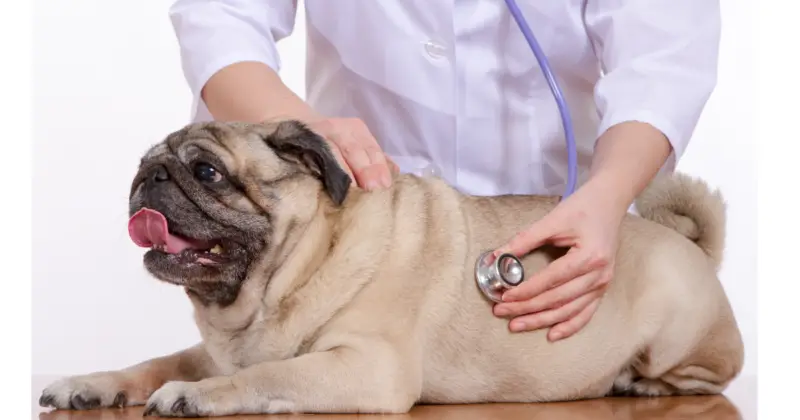
When considering giving your pug melon or any new food, it’s essential to consult with a veterinarian first. They can provide guidance on whether melons are a suitable addition to your pug’s diet and how to introduce them safely. By consulting a veterinarian, you ensure you protect your pug’s health and meet their specific nutritional needs.
In some cases, pugs may have allergies or intolerances to certain foods, including melon. If you suspect this may be the case for your pug, your veterinarian can help diagnose and address any potential issues. They can recommend alternative food options or suggest ways to safely introduce melon without causing gastrointestinal upset for your pug.
As you introduce melon to your pug’s diet, monitoring their digestive system closely is crucial. Pay attention to any signs of gastrointestinal upset, such as vomiting or diarrhea. If your pug shows any of these symptoms, it’s essential to contact your veterinarian for guidance. They can help you determine whether to continue feeding melon to your pug or adjust their diet accordingly.
Remember that while melons can be a healthy and delicious snack for pugs, it’s important not to overfeed them. Moderation is key, as excessive consumption of any food can lead to digestive issues or even weight gain. Your veterinarian can offer advice on the appropriate serving size for your pug, taking into account their age, size, and overall health.
In conclusion, always consult with your veterinarian before introducing new foods like melon to your pug’s diet. They can provide expert guidance to meet your pug’s nutritional needs while minimizing potential health risks. And remember to monitor your pug closely as you incorporate melon into their diet, paying attention to their digestive system and overall well-being.
Frequently Asked Questions: Can Pugs Eat Melon

Is watermelon safe for pugs?
Yes, watermelon is safe for pugs as long as you only feed them the flesh of the fruit. Make sure to remove any seeds and rind before offering it to your pug. Watermelon can provide hydration and essential nutrients but should be given in moderation.
Can pugs consume honeydew melon?
While there isn’t much specific information about pugs and honeydew melon, it is generally accepted that most dogs can consume honeydew melon safely. Like with watermelon, ensure you remove the seeds and rind. Offer small portions of honeydew melon to your pug and monitor for any adverse reactions.
Are there any health benefits of melon for pugs?
Yes, melon provides health benefits for pugs. For example, watermelon is abundant in vitamins C and A, as well as potassium, magnesium, and other nutrients. These nutrients contribute to a healthy diet, and watermelon also helps keep pugs hydrated, particularly during hot weather.
What fruits are suitable for pugs to eat?
Pugs can enjoy various fruits, such as apples (without seeds), bananas, blueberries, and watermelon (seedless). Make sure to avoid feeding your pug grapes or raisins, as these can be toxic to dogs. Always introduce new fruits in small quantities and observe for any potential allergic reactions or digestive issues.
Can pugs eat melon seeds?
No, pugs should not eat melon seeds, including watermelon seeds. Eating seeds can cause choking or digestive blockages in dogs. Always remove seeds from any fruit you feed to your pug to ensure their safety and prevent potential health problems.
Is melon skin harmful to pugs?
Melon skin, particularly from watermelon, should not be fed to pugs. The rind can be difficult for them to digest, which may lead to diarrhea or other digestive issues. Always remove the rind or skin from any fruit you give your pug to keep them safe and healthy.


